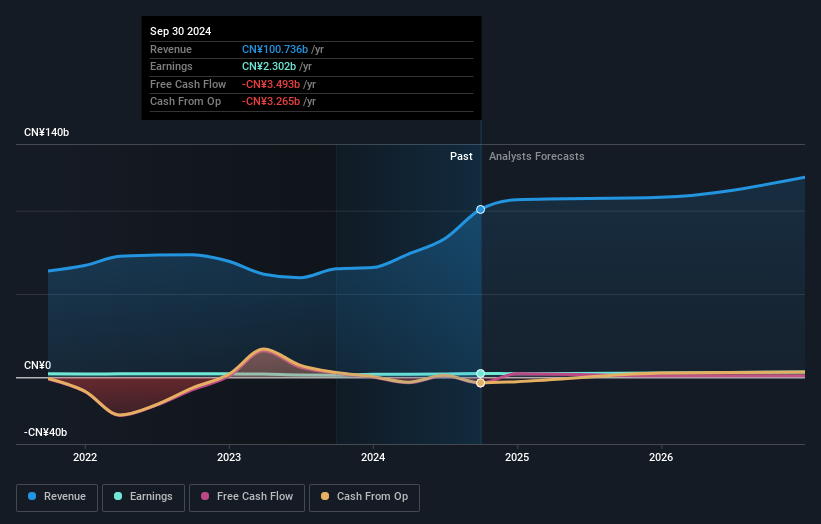- China
- /
- Tech Hardware
- /
- SZSE:000977
Individual investors account for 54% of Inspur Electronic Information Industry Co., Ltd.'s (SZSE:000977) ownership, while private companies account for 32%

Key Insights
- Inspur Electronic Information Industry's significant individual investors ownership suggests that the key decisions are influenced by shareholders from the larger public
- The top 25 shareholders own 43% of the company
- Institutions own 13% of Inspur Electronic Information Industry
A look at the shareholders of Inspur Electronic Information Industry Co., Ltd. (SZSE:000977) can tell us which group is most powerful. And the group that holds the biggest piece of the pie are individual investors with 54% ownership. Put another way, the group faces the maximum upside potential (or downside risk).
Private companies, on the other hand, account for 32% of the company's stockholders.
Let's delve deeper into each type of owner of Inspur Electronic Information Industry, beginning with the chart below.
See our latest analysis for Inspur Electronic Information Industry

What Does The Institutional Ownership Tell Us About Inspur Electronic Information Industry?
Institutions typically measure themselves against a benchmark when reporting to their own investors, so they often become more enthusiastic about a stock once it's included in a major index. We would expect most companies to have some institutions on the register, especially if they are growing.
We can see that Inspur Electronic Information Industry does have institutional investors; and they hold a good portion of the company's stock. This implies the analysts working for those institutions have looked at the stock and they like it. But just like anyone else, they could be wrong. If multiple institutions change their view on a stock at the same time, you could see the share price drop fast. It's therefore worth looking at Inspur Electronic Information Industry's earnings history below. Of course, the future is what really matters.

Hedge funds don't have many shares in Inspur Electronic Information Industry. Our data shows that Inspur Group Limited is the largest shareholder with 32% of shares outstanding. For context, the second largest shareholder holds about 0.9% of the shares outstanding, followed by an ownership of 0.9% by the third-largest shareholder.
A deeper look at our ownership data shows that the top 25 shareholders collectively hold less than half of the register, suggesting a large group of small holders where no single shareholder has a majority.
While studying institutional ownership for a company can add value to your research, it is also a good practice to research analyst recommendations to get a deeper understand of a stock's expected performance. There are plenty of analysts covering the stock, so it might be worth seeing what they are forecasting, too.
Insider Ownership Of Inspur Electronic Information Industry
While the precise definition of an insider can be subjective, almost everyone considers board members to be insiders. The company management answer to the board and the latter should represent the interests of shareholders. Notably, sometimes top-level managers are on the board themselves.
Insider ownership is positive when it signals leadership are thinking like the true owners of the company. However, high insider ownership can also give immense power to a small group within the company. This can be negative in some circumstances.
Our information suggests that Inspur Electronic Information Industry Co., Ltd. insiders own under 1% of the company. However, it's possible that insiders might have an indirect interest through a more complex structure. Being so large, we would not expect insiders to own a large proportion of the stock. Collectively, they own CN¥127m of stock. It is good to see board members owning shares, but it might be worth checking if those insiders have been buying.
General Public Ownership
The general public, mostly comprising of individual investors, collectively holds 54% of Inspur Electronic Information Industry shares. This size of ownership gives investors from the general public some collective power. They can and probably do influence decisions on executive compensation, dividend policies and proposed business acquisitions.
Private Company Ownership
It seems that Private Companies own 32%, of the Inspur Electronic Information Industry stock. Private companies may be related parties. Sometimes insiders have an interest in a public company through a holding in a private company, rather than in their own capacity as an individual. While it's hard to draw any broad stroke conclusions, it is worth noting as an area for further research.
Next Steps:
I find it very interesting to look at who exactly owns a company. But to truly gain insight, we need to consider other information, too. Take risks for example - Inspur Electronic Information Industry has 2 warning signs we think you should be aware of.
If you are like me, you may want to think about whether this company will grow or shrink. Luckily, you can check this free report showing analyst forecasts for its future.
NB: Figures in this article are calculated using data from the last twelve months, which refer to the 12-month period ending on the last date of the month the financial statement is dated. This may not be consistent with full year annual report figures.
New: AI Stock Screener & Alerts
Our new AI Stock Screener scans the market every day to uncover opportunities.
• Dividend Powerhouses (3%+ Yield)
• Undervalued Small Caps with Insider Buying
• High growth Tech and AI Companies
Or build your own from over 50 metrics.
Have feedback on this article? Concerned about the content? Get in touch with us directly. Alternatively, email editorial-team (at) simplywallst.com.
This article by Simply Wall St is general in nature. We provide commentary based on historical data and analyst forecasts only using an unbiased methodology and our articles are not intended to be financial advice. It does not constitute a recommendation to buy or sell any stock, and does not take account of your objectives, or your financial situation. We aim to bring you long-term focused analysis driven by fundamental data. Note that our analysis may not factor in the latest price-sensitive company announcements or qualitative material. Simply Wall St has no position in any stocks mentioned.
About SZSE:000977
Inspur Electronic Information Industry
Inspur Electronic Information Industry Co., Ltd.
Proven track record and fair value.


